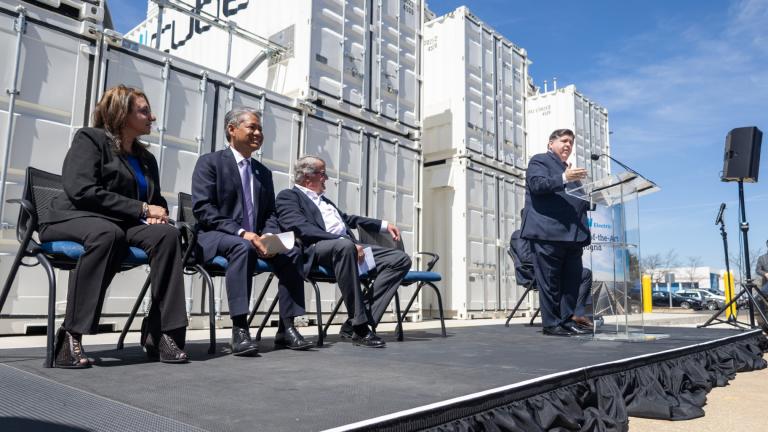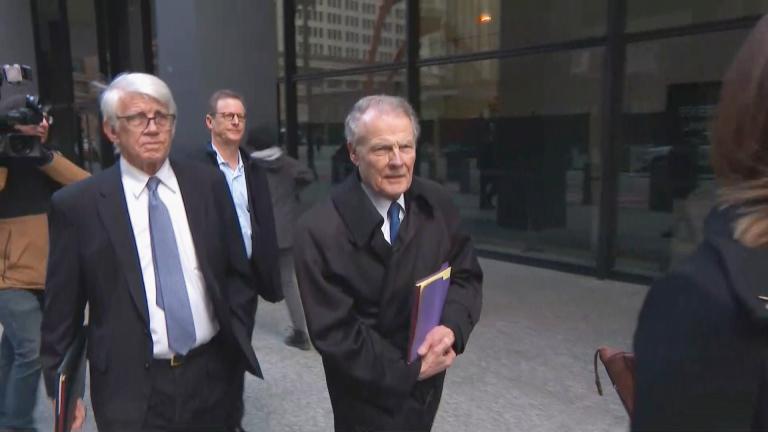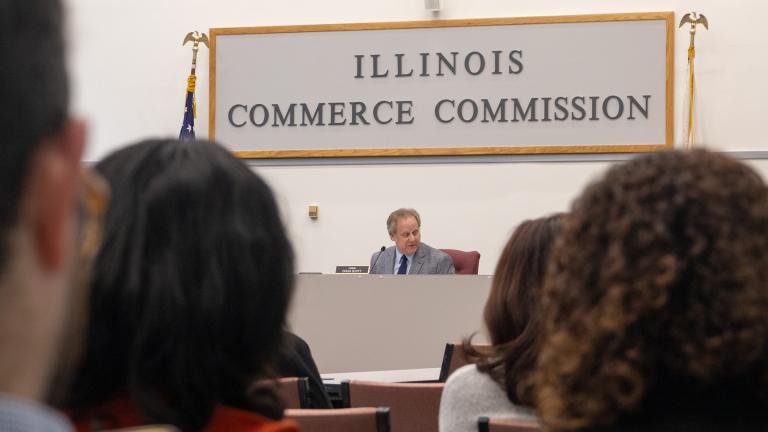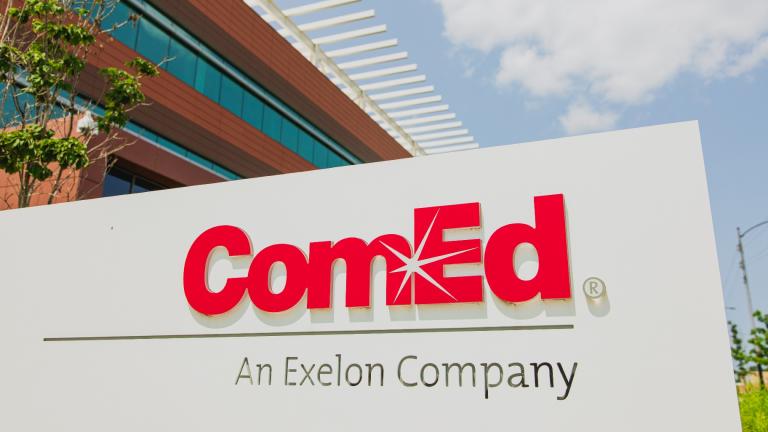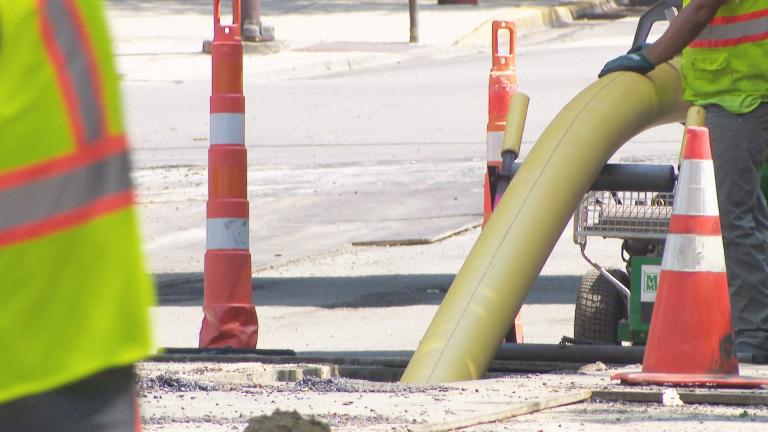 (Michael Izquierdo / WTTW News)
(Michael Izquierdo / WTTW News)
A group of businesses filed a complaint with state regulators last week alleging that Chicago electric company Commonwealth Edison improperly raised customer bills this summer.
The complaint – centered on a portion of the 2021 Climate and Equitable Jobs Act that allows utilities to recoup carbon mitigation investments – alleges the utility failed to follow the proper regulatory channels laid out in Gov. J.B. Pritzker’s marquee climate policy.
The complaint was filed by the Chemical Industry Council of Illinois, a trade group that lobbies for chemical businesses, alleging the change in billing will cost its roughly 100 member companies about $100 million combined between June 2023 and May 2024. Eight other groups are also listed as complainants, including Loyola Academy, a suburban Catholic school.
Read the ICC complaint.
It’s the latest salvo in the industrial sector’s opposition to elements of CEJA. Other major business groups have long warned that CEJA could result in increased energy costs, especially to large industrial customers, which are among the biggest users of electricity.
The Illinois Commerce Commission will consider the complaint, which could set a precedent allowing the oversight agency to have tighter control over how fees are calculated. All five of the commission’s members were appointed by Pritzker.
The fee at the center of the complaint is the “Carbon-Free Resource Adjustment,” or CFRA. The complaint alleges the fee was calculated without proper oversight and asks the ICC to order ComEd to stop using CFRA to recover costs and reimburse the complainants for any fees already collected this year. ComEd began collecting money from customers using CFRA in June.
While businesses filed the complaint, the CFRA charge appears on residential customers’ bills as well. ComEd serves 3.8 million residential customers and 400,000 non-residential customers, according to data from the ICC. For residential customers, this fee currently accounts for around 7 percent of total monthly bills, depending on local taxes and electric usage.
The hearing process, which is overseen by an administrative judge, could take up to a year unless the parties agree to an extension. The case will then be decided by the five governor-appointed commissioners of the ICC.
CEJA’s Role
The authority to charge such a fee comes from a provision in CEJA that provided subsidies to nuclear power plants in an effort to save three aging plants from going offline.
The law outlined a program that allows the state to purchase energy in bulk from three of the state’s six nuclear power plants at fixed rates using a financial instrument called carbon mitigation credits, or CMCs, which are then sold to electric utilities.
This guaranteed income was intended to entice Exelon, the then-owner of Illinois’ nuclear fleet, to keep open several plants it had planned to close. In early 2022, Exelon – which remains ComEd’s parent company – spun out its nuclear generation arm into an independent company, Constellation Energy. Constellation’s executive team is entirely made up of former ComEd and Exelon executives and managers.
Under the CMC program, if the actual market rate for electricity is lower than the cost of CMCs, utilities can credit consumers for the difference – something they did last year, saving the average customer around $20 per month, according to a press release from Pritzker from the time. If the market rate is higher than the fixed price, utilities may add a charge to customer bills to make up the difference.
The complaint alleges that ComEd increased the CFRA charge to customers in June to include a “clawback” of money that was credited to customers last year in addition to compounded interest on those fees. This change was outlined in a set of revisions to the legal document outlining how ComEd calculates CFRA fees based on its “tariff” – the document that defines what rates utilities can charge. These revisions were not “suspended,” meaning the ICC held no formal hearings on the subject.
In a May 2023 filing with the U.S. Securities and Exchange Commission, Exelon told federal regulators and investors that ComEd lost $1.1 billion due to the CMC program between June 2022 and March 2023.
The fact that ComEd determined losses on its own, the complainants allege, violated a provision of CEJA that requires those determinations to be reviewed by the ICC in an annual proceeding.
“As a result of ComEd’s lack of disclosure of the real nature of its filings of these tariff revisions with the Commission, no party had an opportunity to object to the massive impacts of ComEd’s revisions,” the complaint reads.
The business groups also allege ComEd’s maneuver violates the state’s Public Utilities Act as an act of “imprudent management” of the Carbon Free Resource Adjustment credits and charges.
“It was never reviewed, there were never any hearings on it, it’s a lot of money and our position is that it violates the law,” Patrick Giordano, a lawyer representing the business groups listed in the complaint, told Capitol News Illinois.
ComEd has denied impropriety in its use of the adjustment and CMCs.
“We are appropriately charging and crediting customers and have been clear about the CMCs and the charges and credits that implement them with the Commission and our customers,” Shannon Breymaier, ComEd’s head of communications, said in an email. “We’re still analyzing the complaint, but expect to vigorously defend our actions in implementing carbon mitigation credits.”
Constellation, which has attributed continued operations of three of Illinois’ nuclear plants to the CMC program, signaled caution regarding the program to its investors in a February regulatory filing with the SEC. In it, the company noted that “regulatory or legal” challenges like this were possible and that the company “cannot reasonably predict the outcome of any such challenges.”
CEJA’s Other Effects
The complaint is not the only matter before the ICC that will largely define the strength of CEJA’s regulatory backbone.
The commission is currently considering sets of plans from both ComEd and Ameren Illinois that set the utilities’ next four years of electric rates, infrastructure spending and long-term plans for the electric grid. These complex plans are the result of CEJA’s reforms to the state’s ratemaking process.
The ICC is expected to approve modified versions of these plans before the end of the year.
CEJA also opened the door for closer ICC oversight of utilities’ profit rates and the energy sector’s environmental impacts. This has attracted the attention of national and state-level advocacy groups.
Similarly, because of a requirement in CEJA, the ICC has requested all large gas and electric utilities in the state offer discounted energy rates to low-income customers. Consumer advocates are currently sparring with gas utilities over the question of how steep these discounts should be and who should be eligible for them in cases that are also expected to finish before the end of the year.
Electric utilities are expected to file low-income rate design plans in the coming years.
Capitol News Illinois is a nonprofit, nonpartisan news service covering state government. It is distributed to hundreds of print and broadcast outlets statewide. It is funded primarily by the Illinois Press Foundation and the Robert R. McCormick Foundation, along with major contributions from the Illinois Broadcasters Foundation and Southern Illinois Editorial Association.

